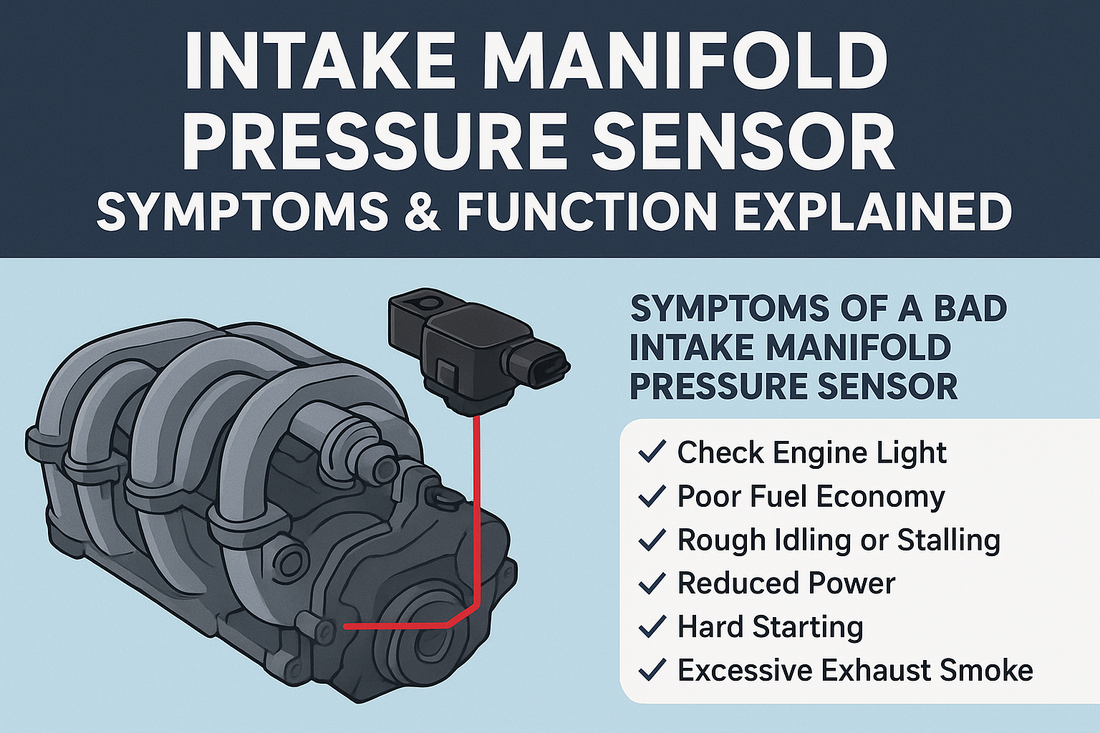
Intake Manifold Pressure Sensor Symptoms and Why Replacement Matters
Share
If your car has been running rough, using more fuel than usual, or struggling to accelerate, one component worth checking is the intake manifold pressure sensor, also known as the MAP sensor. This small but critical sensor plays a major role in your vehicle’s performance. Understanding what it does and recognizing the warning signs of failure can help you avoid expensive repairs.

What Does an Intake Manifold Pressure Sensor Do?
The intake manifold pressure sensor measures the air pressure inside the intake manifold. It sends this data to the vehicle’s Engine Control Unit (ECU), which uses it to calculate the correct air-fuel mixture for combustion.
- Too much fuel (rich mixture) → Reduced efficiency, black smoke, clogged catalytic converter.
- Too little fuel (lean mixture) → Loss of power, higher engine temperatures, potential engine knock.
A properly functioning MAP sensor ensures your engine runs efficiently, delivers smooth acceleration, and keeps emissions within legal limits.
Symptoms of a Bad Intake Manifold Pressure Sensor
When a MAP sensor starts to fail, you may notice:
-
Check Engine Light (CEL)
The ECU detects incorrect readings and alerts you via the dashboard warning light. -
Poor Fuel Economy
Fuel is wasted because the ECU miscalculates how much is needed. -
Rough Idling or Stalling
At idle, the engine may shake or even cut out unexpectedly. -
Loss of Power
Acceleration feels sluggish, and the vehicle struggles to maintain performance. -
Hard Starting
Incorrect air-fuel calculations make cold starts more difficult. -
Excessive Exhaust Smoke
Too much fuel in the mixture can cause thick, black smoke from the exhaust pipe.
If you are experiencing several of these issues, replacing the MAP sensor should be high on your list of potential fixes.
Replacement MAP Sensors for Different Brands
Choosing the right replacement part is essential. Here are some quality options suited for popular vehicle brands:
- Manifold Absolute Pressure MAP Sensor 2897331 for Cummins – Reliable fit for heavy-duty diesel engines.
- Intake Air Pressure Sensor MAP F01R00E006 for Great Wall – Designed specifically for Great Wall vehicles.
- Manifold Absolute Pressure MAP Sensor 12219935 for Buick – OEM replacement for Buick models.
- Manifold Intake Pressure MAP Sensor 89420-20230 for Toyota – Ensures consistent Toyota engine performance.
- Manifold Air Pressure MAP Sensor 0281002246 for Mercedes-Benz – Precision part for Mercedes-Benz vehicles.
Each of these MAP sensors is designed for accurate pressure readings and long-term reliability, helping restore your engine’s smooth performance.
Why Timely Replacement Is Important
Ignoring a failing MAP sensor can cause:
- Your wallet takes a hit – a bad MAP sensor makes your car gulp fuel like a thirsty camel, sending your fuel bills sky-high.
- The emissions test nightmare – clouds of dark smoke could have your car failing inspections faster than you can say “check engine light.”
-
Silent engine killer – incorrect combustion slowly wears down vital components, turning small issues into big repair bills if ignored.
Replacing the sensor promptly restores fuel efficiency, protects the engine, and improves overall driving comfort.